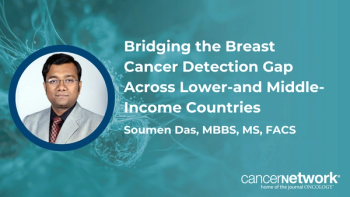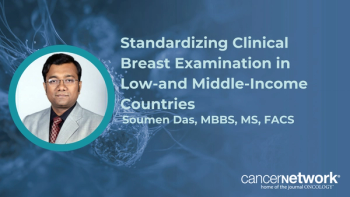
Survival Gains Associated With Immuno-Oncology Found to be Significant for SCLC
Data presented at the 2020 World Conference on Lung Cancer Singapore reported gains in survival at the population and patient levels for those with SCLC treated with immunotherapy.
The potential health gains associated with immuno-oncology treatments for small cell lung cancer (SCLC) are significant, at both the patient and population level, according to research presented at the International Association for the Study of Lung Cancer 2020 World Conference on Lung Cancer. Patient age should be taken into account however, to avoid bias and improve data accuracy.
“The methods in this study and the inferences taken from this study are positioned to be useful to clinicians and decision-makers in assessing and quantifying the expected survival advantages of [immune-oncology] therapies based on a range of clinically plausible protocols that may be considered in clinical practices,” said Jason Gordon, PhD, technical director of HEOR in Cardiff, United Kingdom, and honorary associate professor at University of Nottingham in the United Kingdom, during the virtual presentation.
Previously, immuno-oncology has been successful in improving responses in overall survival (OS) for SCLC. “These novel therapies call for more complicated survival modeling to support the underlying mode of action and clinical plausibility associated with heterogenous response profiles, which are not reflected with standard modeling techniques,” said Gordon during the presentation.
The objective in this comparative approach study was to find the historical age-specific SCLC survival rates in the United States and to compare these with expected immuno-oncology survival for a range of durable response rates using mixture cure modeling, which recognizes the mixture of distributions of survival outcomes of patients, said Gordon.
To find historical OS for patients (baseline age, 70 years) with metastatic SCLC, researchers used information from the Surveillance Epidemiology and End Results (SEER) database, which was associated with an expected median OS of 5.8 months. Of the patients in this database, approximately 11% survived at 26 months and approximately 5% survived at 60 months.
Data from the CheckMate 032 study were also used, which assessed the effects of nivolumab (Opdivo) and led to a median OS of 4.4 months. Approximately 21% of patients from this study survived at 26 months. They used this study to assume expected outcomes after 26 months, which they projected that 10% of the eligible population would achieve a durable response.
Incremental survival was estimated at a population level by comparing historical outcomes from SEER to long-term survival estimates for patients who received immune-oncology therapy.
“Our results demonstrate there were significant and consistent survival advantages associated [with immune-oncology] treatments compared with historical standards of care,” said Gordon.
Mean OS in patients treated with immuno-oncology treatments was an estimated 29.5 months, with incremental survival gains of 21.2 months. There were significant survival gains across all ages, although more were observed in younger patients compared with older patients.
Researchers used a plausible long-term response fraction for 10% to 100% of survivors (approximately 21% of the study population) at 26 months, which equated to 2.1% to 21% of all patients. When age-adjusted incremental survival estimates were applied to the population with incident SCLC (n = 13,570), approximately 27,000 life years were gained with a 10% long-term response fraction, 10,138 life years gained with a 2.1% long-term response fraction and 43,476 life years gained for the 21% long-term response fraction.
“Future research exploring additional data sets, populations and the generalized ability of the study inferences should be considered,” said Gordon.
Reference:
Gordon J, McEwan P, Kirkness P, et al. Survival in Advanced SCLC: Projected Impact of Immuno-Oncology-Associated Durable Response on Population Health Gains in US. Presented at: 2020 World Conference on Lung Cancer Singapore; January 28-31, 2021; virtual. Abstract FP10.01.
Newsletter
Stay up to date on recent advances in the multidisciplinary approach to cancer.


































